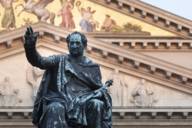
The first king of Bavaria was Max Joseph of the House of Wittelsbach. He’s considered the creator of the modern Bavarian state. His subjects valued his honest and modest nature, although he came from a rather illustrious household that gave him a somewhat chaotic childhood.
Max Joseph was the son of Count Palatine Michael of Zweibrücken-Birkenfeld and Maria Francisca Dorothea of Palatine-Sulzbach. He came from an illustrious household. His mother had a love affair, which meant she was only allowed to move to her residence at Sulzbach Castle after her husband’s death. Due to the absence of his mother, Max was mainly educated under the supervision of his uncle. Elector Charles Theodore acted as his guardian. As his heir, the boy was to take control of the government in 1799 – over 40 years later – and would become the first ever King of Bavaria.
The state was in a difficult situation at the time: Bavaria was facing a political crushing at the hands of its Austrian and French neighbours, and Charles Theodore had left behind a country in serious debt. The new Bavarian ruler and his minister Maximilian von Montgelas were well prepared for both of these problems.
As regards its foreign policy, Bavaria fully sided with France in 1805. Bavaria was made a kingdom as a token of its allegiance. The French emperor Napoleon named Max Joseph king. This increase in rank gave Max greater political freedom. A short time later, however, he changed sides again as Napoleon became less important. This was a purely political manoeuvre, as King Max was actually quite fond of France through his background and education.

Max I Joseph and Minister Montgelas then reformed all areas of domestic life. And this was much needed as well, as the Bavarian territory had grown significantly in size. They established posts for civil servants and created an efficient state administration. They divided the state into 15 administrative districts, which later became eight, introduced compulsory education and created a unified economic area by standardising measures, weights and currencies, abolishing internal duties and relaxing the mandatory membership of guilds.
That’s why Max I Joseph is considered the creator of the modern Bavarian state. By the time he died at Schloss Nymphenburg in 1825, Bavaria had become a constitutional monarchy with a modern government. Bavaria’s borders were largely the same as they are today. Munich’s Max-Joseph-Platz (square) and Maxvorstadt district were named after the king.
“Father Max” was the people’s favourite. He was seen as an honest, good-natured and humble person. He only occupied smaller chambers in the Munich Residenz next to his children’s rooms. Max Joseph had married Augusta Wilhelmine of Hesse-Darmstadt in 1785 when he was still the Duke of Zweibrücken, and she died in 1796. Their marriage produced five children, including Ludwig, the future heir to the Bavarian throne. Max fell in love with Princess Caroline of Baden in the very same year, and the two had eight children together.